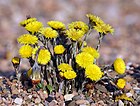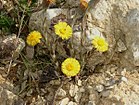Note: This is a project under development. The articles on this wiki are just being initiated and broadly incomplete. You can Help creating new pages.
Difference between revisions of "Tussilago farfara - Colt's Foot"
(→Photo Gallery) |
(→References) |
||
| (13 intermediate revisions by 2 users not shown) | |||
| Line 1: | Line 1: | ||
| − | + | [[File:Tussilago farfara1.jpg|thumb|right]] | |
| − | Tussilago farfara | + | '''Tussilago farfara''' is a plant in the groundsel tribe in the daisy family Asteraceae and it is native to Europe and parts of western and central Asia. |
==Uses== | ==Uses== | ||
| − | {{Uses| | + | {{Uses|Asthma}}, {{Uses|Laryngitis}}, {{Uses|Bronchitis}}, {{Uses|Whooping cough}}, {{Uses|Eczema}}, {{Uses|Blotches}}, {{Uses|Pimples}}, {{Uses|Diarrhea}}, {{Uses|Sore throats}} |
==Parts Used== | ==Parts Used== | ||
| Line 14: | Line 14: | ||
==Common names== | ==Common names== | ||
{{Common names|kn=|ml=|sa=|ta=|te=|hi=Watpan|en=Colt's Foot, Coltsfoot}} | {{Common names|kn=|ml=|sa=|ta=|te=|hi=Watpan|en=Colt's Foot, Coltsfoot}} | ||
| + | |||
| + | ==Properties== | ||
| + | Reference: Dravya - Substance, Rasa - Taste, Guna - Qualities, Veerya - Potency, Vipaka - Post-digesion effect, Karma - Pharmacological activity, Prabhava - Therepeutics. | ||
| + | ===Dravya=== | ||
| + | |||
| + | ===Rasa=== | ||
| + | |||
| + | ===Guna=== | ||
| + | |||
| + | ===Veerya=== | ||
| + | |||
| + | ===Vipaka=== | ||
| + | |||
| + | ===Karma=== | ||
| + | |||
| + | ===Prabhava=== | ||
==Habit== | ==Habit== | ||
| Line 20: | Line 36: | ||
==Identification== | ==Identification== | ||
===Leaf=== | ===Leaf=== | ||
| − | {{Leaf|Simple| | + | {{Leaf|Simple|Alternate|There is one leaf per node along the stem and basal of the leaves are growing only at the base of the plant}}<ref name="Leaf"/> |
===Flower=== | ===Flower=== | ||
| − | {{Flower| | + | {{Flower|Bisexual|2-4cm long|Yellow|5-20|The flower head has tubular disk flowers in the center and ray flowers, these often strap-shaped, around the periphery}} |
===Fruit=== | ===Fruit=== | ||
| − | {{Fruit|| | + | {{Fruit|Tufted seeds|0.3 cm long|Cylindrical in shape and yellow or red brown in color||}} |
===Other features=== | ===Other features=== | ||
==List of Ayurvedic medicine in which the herb is used== | ==List of Ayurvedic medicine in which the herb is used== | ||
| − | |||
==Where to get the saplings== | ==Where to get the saplings== | ||
| Line 38: | Line 53: | ||
==How to plant/cultivate== | ==How to plant/cultivate== | ||
| − | + | Seed - the plant does not usually require help with spreading itself around, but if required the seed can be sown in situ in early spring or autumn. Division of the roots is very easy and succeeds at almost any time in the year.<ref name="How to plant/cultivate"/> | |
==Commonly seen growing in areas== | ==Commonly seen growing in areas== | ||
| Line 66: | Line 81: | ||
<references> | <references> | ||
| − | <ref name="chemical composition">[https://www.rxmed.com/herbal/coltsfoot | + | <ref name="chemical composition">[https://www.rxmed.com/herbal/coltsfoot Chemical Composition]</ref> |
| − | <ref name="Leaf">[https://gobotany.newenglandwild.org/species/tussilago/farfara/ | + | <ref name="Leaf">[https://gobotany.newenglandwild.org/species/tussilago/farfara/ Characteristics]</ref> |
| − | <ref name="How to plant/cultivate">[https://www.pfaf.org/user/plant.aspx?LatinName=Tussilago+farfara | + | <ref name="How to plant/cultivate">[https://www.pfaf.org/user/plant.aspx?LatinName=Tussilago+farfara Cultivation details]</ref> |
</references> | </references> | ||
==External Links== | ==External Links== | ||
| − | * [http://www.luontoportti.com/suomi/en/kukkakasvit/coltsfoot] | + | * [http://www.luontoportti.com/suomi/en/kukkakasvit/coltsfoot Tussilago farfara on nature gate] |
| − | + | ||
| − | * [https://www.herbal-supplement-resource.com/coltsfoot.html] | + | * [https://www.herbal-supplement-resource.com/coltsfoot.html Coltsfoot – Health Benefits and Side Effects] |
| − | * [http://www.essencejournal.com/pdf/2016/vol4issue3/PartA/4-3-7-342.pdf] | + | * [http://www.essencejournal.com/pdf/2016/vol4issue3/PartA/4-3-7-342.pdf Potential interest of Tussilago farfara (L.) whole plantof Lithuanian and French origin for essential oil extraction] |
| − | * [https://www.tandfonline.com/doi/abs/10.1080/0972060X.2011.10643595] | + | * [https://www.tandfonline.com/doi/abs/10.1080/0972060X.2011.10643595 Volatile Oils of Flowers and Stems of Tussilago farfara L. from Lithuania] |
[[Category:Herbs]] | [[Category:Herbs]] | ||
| + | [[Category:Ayurvedic herbs that don't have seed photos]] | ||
| + | [[Category:Asteraceae]] | ||
Latest revision as of 11:54, 28 August 2020
Tussilago farfara is a plant in the groundsel tribe in the daisy family Asteraceae and it is native to Europe and parts of western and central Asia.
Contents
- 1 Uses
- 2 Parts Used
- 3 Chemical Composition
- 4 Common names
- 5 Properties
- 6 Habit
- 7 Identification
- 8 List of Ayurvedic medicine in which the herb is used
- 9 Where to get the saplings
- 10 Mode of Propagation
- 11 How to plant/cultivate
- 12 Commonly seen growing in areas
- 13 Photo Gallery
- 14 References
- 15 External Links
Uses
Asthma, Laryngitis, Bronchitis, Whooping cough, Eczema, Blotches, Pimples, Diarrhea, Sore throats
Parts Used
Chemical Composition
Tussilagin, Sitosterol, Gallic, tartaric and malic acids, Tannins, Dextrin, Mucus, Mnulin, Flavonoids, Vitamin C[1]
Common names
| Language | Common name |
|---|---|
| Kannada | |
| Hindi | Watpan |
| Malayalam | |
| Tamil | |
| Telugu | |
| Marathi | NA |
| Gujarathi | NA |
| Punjabi | NA |
| Kashmiri | NA |
| Sanskrit | |
| English | Colt's Foot, Coltsfoot |
Properties
Reference: Dravya - Substance, Rasa - Taste, Guna - Qualities, Veerya - Potency, Vipaka - Post-digesion effect, Karma - Pharmacological activity, Prabhava - Therepeutics.
Dravya
Rasa
Guna
Veerya
Vipaka
Karma
Prabhava
Habit
Identification
Leaf
| Kind | Shape | Feature |
|---|---|---|
| Simple | Alternate | There is one leaf per node along the stem and basal of the leaves are growing only at the base of the plant |
Flower
| Type | Size | Color and composition | Stamen | More information |
|---|---|---|---|---|
| Bisexual | 2-4cm long | Yellow | 5-20 | The flower head has tubular disk flowers in the center and ray flowers, these often strap-shaped, around the periphery |
Fruit
| Type | Size | Mass | Appearance | Seeds | More information |
|---|---|---|---|---|---|
| Tufted seeds | 0.3 cm long | Cylindrical in shape and yellow or red brown in color | {{{6}}} |
Other features
List of Ayurvedic medicine in which the herb is used
Where to get the saplings
Mode of Propagation
How to plant/cultivate
Seed - the plant does not usually require help with spreading itself around, but if required the seed can be sown in situ in early spring or autumn. Division of the roots is very easy and succeeds at almost any time in the year.[3]
Commonly seen growing in areas
Woodland Garden Sunny Edge, Dappled Shade, Hedgerow.
Photo Gallery
References
External Links
- Ayurvedic Herbs known to be helpful to treat Asthma
- Ayurvedic Herbs known to be helpful to treat Laryngitis
- Ayurvedic Herbs known to be helpful to treat Bronchitis
- Ayurvedic Herbs known to be helpful to treat Whooping cough
- Ayurvedic Herbs known to be helpful to treat Eczema
- Ayurvedic Herbs known to be helpful to treat Blotches
- Ayurvedic Herbs known to be helpful to treat Pimples
- Ayurvedic Herbs known to be helpful to treat Diarrhea
- Ayurvedic Herbs known to be helpful to treat Sore throats
- Herbs with Flowers used in medicine
- Herbs with Leaves used in medicine
- Herbs with common name in Hindi
- Herbs with common name in English
- Habit - Perennial herbaceous plant
- Index of Plants which can be propagated by Seeds
- Herbs that are commonly seen in the region of Woodland Garden Sunny Edge
- Herbs that are commonly seen in the region of Dappled Shade
- Herbs that are commonly seen in the region of Hedgerow
- Herbs
- Ayurvedic herbs that don't have seed photos
- Asteraceae
















